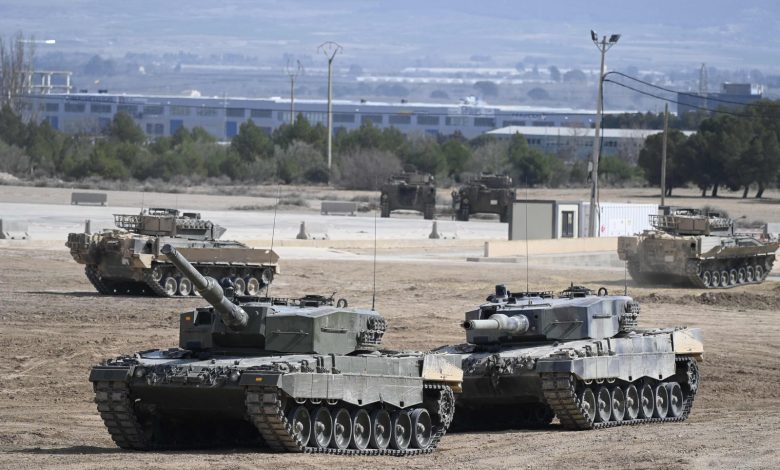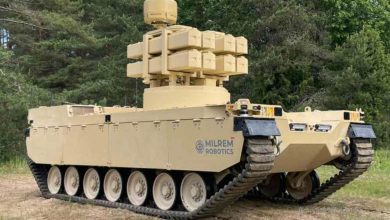German firms to boost arms output, seek Ukraine orders clarity

The defense industry in Germany is prepared to increase its production, including in terms of weapons and ammunition required by Ukraine. However, they require a clear understanding of the demand from governments before investing in expanding their production capabilities.
Ukraine became the world’s third largest importer of arms in 2022 after Russia’s invasion triggered a big flow of military aid to Kyiv from the United States and Europe, according to Swedish think-tank SIPRI.
Some of those arms were transferred from Western military stocks to Ukraine, while in other cases Kyiv has purchased equipment with its own money or funds provided by allies. But there are concerns particularly over the rate at which Ukraine is using ammunition, straining the capacity of Western defense companies to keep both the Ukrainian military and their own resupplied.
“What’s important for us as an industry is to get predictability,” the head of Germany’s arms manufacturing association said in an interview this week with The Associated Press.
“That means we have to be clearly told which products are needed within which time,” said Hans Christoph Atzpodien, managing director of the Federation of German Security and Defense Industries.
“And we are prepared. The industry is much more flexible than it is given credit for,” he added.
The association’s members, which include major arms manufacturers such as Rheinmetall, can further boost production, such as by reactivating mothballed facilities and machines, and hiring more staff, he said.
“Of course we also need a firm basis in the form of orders, so that the investments can be carried out,” said Atzpodien, adding that proposals to bundle purchases at the European rather than the national level could help – provided this does not slow down the procurement process.
Likewise, German arms manufacturers are keen to see European countries harmonize their export rules to avoid being disadvantaged compared with competitors in some neighboring countries, he said.
After initially hesitating to send lethal weapons to Ukraine, Germany has become one of Kyiv’s biggest arms suppliers. The shift has already seen Berlin provide Ukraine with dozens of self-propelled Gepard anti-aircraft guns, Iris-T missile systems, howitzers and millions of rounds of ammunition, but left some Germans deeply uneasy about the possibility of being dragged into a conflict with nuclear-armed Russia.
Still, Atzpodien said the final decision on where German-made arms can go should remain a matter for the government. “As companies we agree that German weapons must never fall into the wrong hands,” he said.
The German government declined to comment on Monday over reports that Rheinmetall is in talks with Ukraine about building a tank factory in the country. The company’s Leopard 2 tanks are urgently sought by Ukraine, which was recently promised several dozen from Western stocks, but officials would not say whether this requires government approval.
Germany’s own arms procurement has come under scrutiny after Chancellor Olaf Scholz pledged last year to increase defense spending to NATO’s target of 2% of GDP and create a 100-billion-euro ($107 billion) special fund.
On Tuesday, parliament’s commissioner for the military lamented the slow pace of Germany’s drive to modernize its armed forces. She noted that none of the 100 billion-euro special fund was actually spent last year, though some major orders were placed.
“It is also important to quickly replace equipment that was given to Ukraine” and to speed up maintenance of existing equipment, Eva Hoegl said as she presented her annual report.
“The Bundeswehr has too little of everything, and even less since Feb. 24 (2022). We have too few tanks to be able to train sufficiently, to exercise. Boats and ships are lacking, aircraft are lacking,” she said.
Along with the cash coming its way because of the war in Ukraine – Germany’s defense minister is also seeking to raise his budget by 10 billion euros a year – the German arms industry is hoping the conflict will mark a turning point in the way military spending is classified in Europe.
Some banks and investors in the European Union will not engage in business with the defense sector because of concerns that it is engaged in unsustainable activity that does more harm than good in the long run, much like fossil fuel producers.
Russia’s attack on Ukraine had shown the value of military security, said Atzpodien.
“Our demand is that products we deliver to the German military or other NATO armed forces, for example, are recognized in such a way by the EU that they support sustainability. A signal like that would be important so that actors on the financial markets can adjust to it accordingly,” he said.
German arms manufacturers have already come up with a slogan to push their case, he added, “Security is the key to sustainability.”





